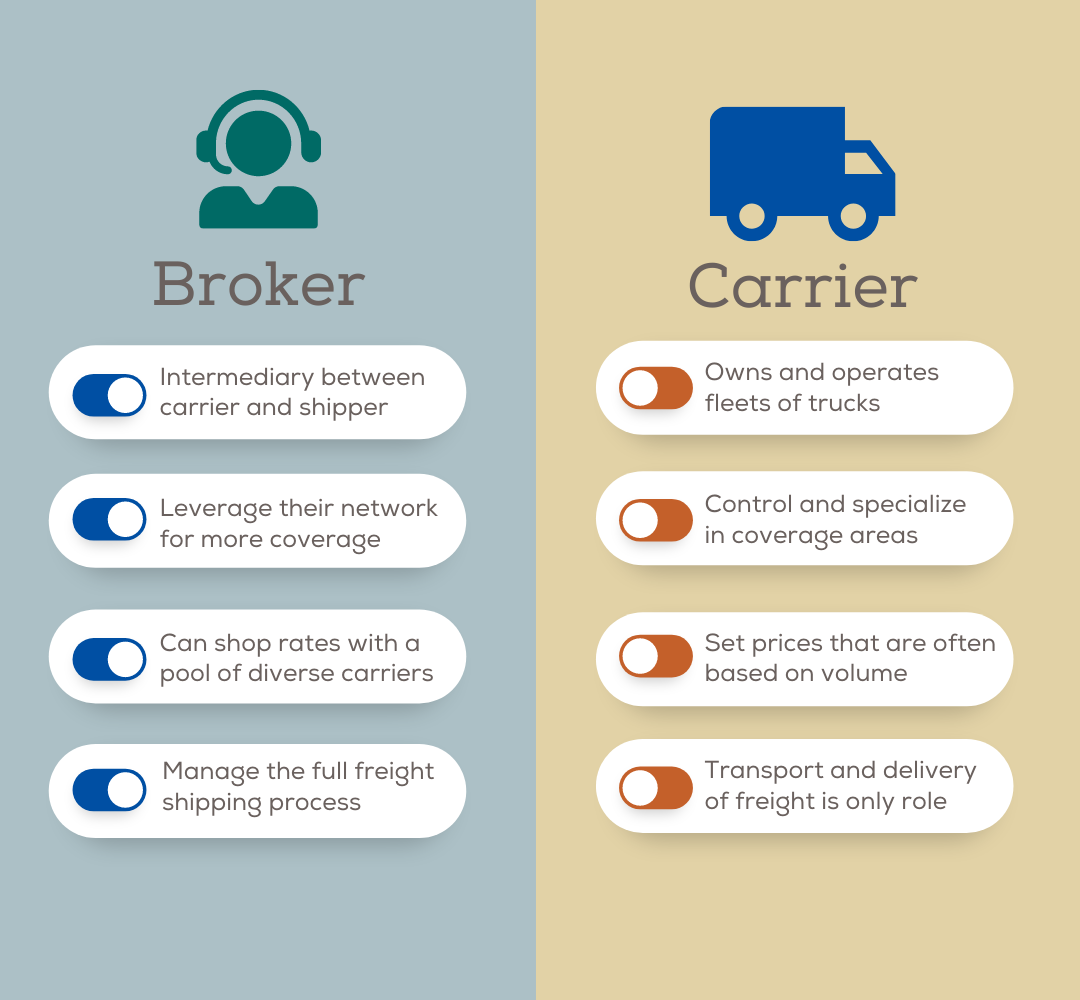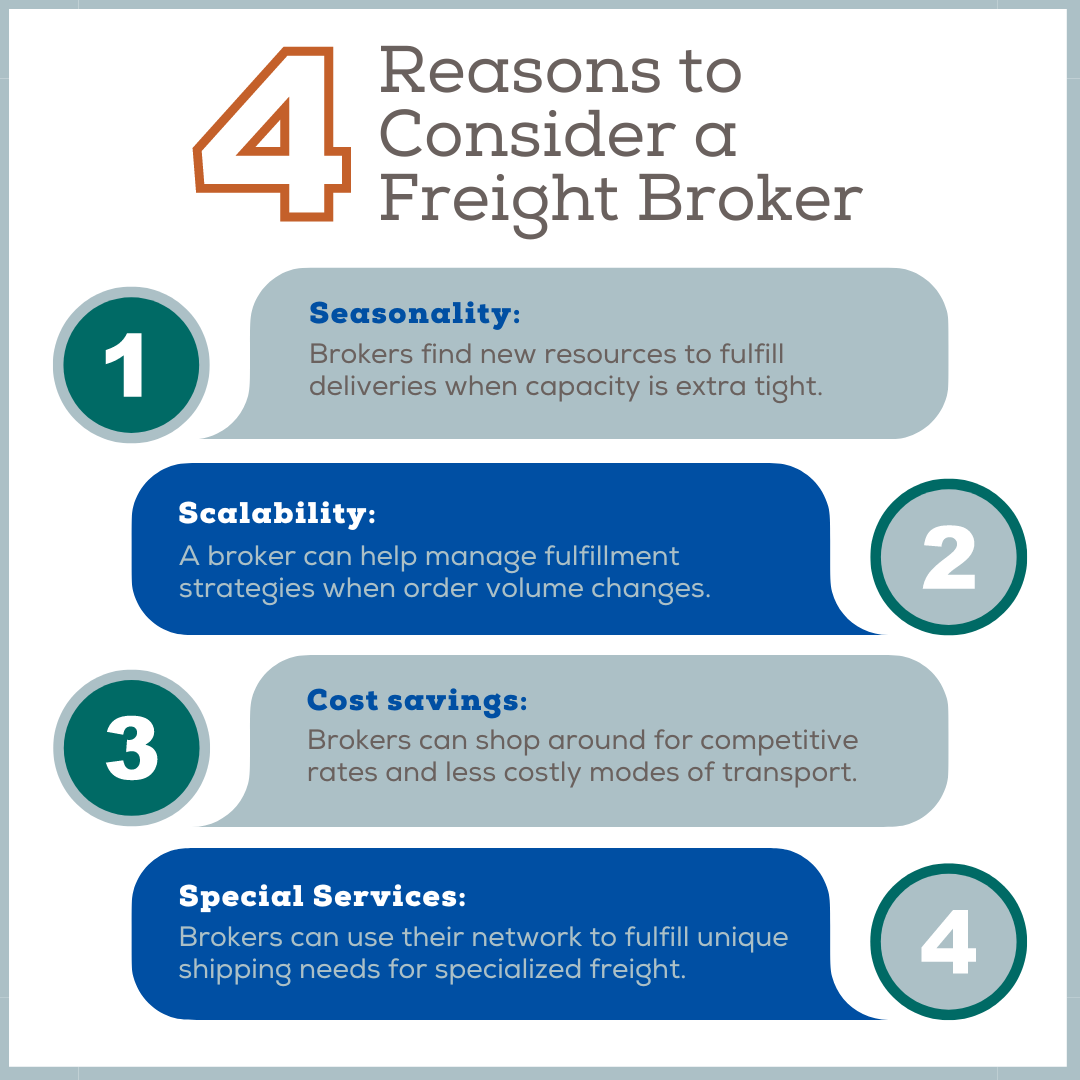Freight Brokers vs. Carriers: What Are the Real Differences?
06/20/2023 — Jen Deming
The freight industry can be a confusing place. It's pretty easy to get lost in terminology, and even experienced shippers can find themselves puzzled by basic questions. For example: what's the difference between a freight broker and carrier?
It turns out there are actually three key distinctions between the two parties, and understanding how each factor affects your load is important for smooth shipping.
Key Distinction #1: Responsibility to shipper
When looking at a freight broker and carrier, it's important to understand the primary responsibility of each party in the physical transportation of your freight.
What is a carrier?
A carrier refers to the company, or operator, that directly handles the transportation of your shipment. Common national carriers include TForce Freight, YRC Freight, ArcBest, and more. Carriers can specialize in less-than-truckload (LTL), dedicated truckload freight, or even specialized services such as refrigerated or oversized freight equipment.
What is a freight broker?

A freight brokerage is a company that serves as a transportation intermediary rather than directly operating a truck fleet and physically moving your freight. A freight broker's job is to contract available loads with a carrier and find an acceptable rate within a specified time frame according to the shipper. The freight broker cuts down the time and effort it may take for a company to look for its own carriers and may decrease costs by shopping quotes.
Key Distinction #2: Geographical restrictions
Freight carriers and brokerages serve distinct areas in the U.S. and sometimes overseas. Knowing their strongest network locations can guide your business decision.
Where do carriers operate?
Common carriers, like XPO Logistics, primarily move freight loads. They have hubs in high-demand areas offering maximum truck availability and competitive pricing. For regions outside these hubs, they may have limited schedules or collaborate with regional carriers for rural deliveries. These regional carriers are smaller businesses operating within a specific area and have exceptional proficiency within their zone. Essentially, national carriers can deliver anywhere in the U.S., but for remote areas, they might need to involve regional carriers which could result in longer delivery times.
Where do freight brokers operate?
Third-party logistics providers don't need to manage assets or trucks, so they can operate from any location. Many have main offices in popular shipping areas and satellite offices across the country. Some specialize in certain industries, like oversized freight or cross-border shipping. A broker can also focus on building relationships with transportation carriers for increased flexibility and specialized service.
Key Distinction #3: Liability for claims
In damage claims, carriers are generally legally liable due to the Carmack Amendment, while brokers aren't. However, brokers can and should aid in dispute resolution. With blurred lines between the two parties, it's important to explore them in detail.

What is a carrier's liability?
Per the Carmack Amendment, the carrier owns the items while they are being transported. When the carrier agrees to transport something, a deal is made based on the shipper load and count on the bill of lading (BOL). The shipper signs this document, saying that they packed and counted everything correctly. From the moment the goods are picked up until they are delivered, the carrier is in charge. If anything gets lost or damaged, the carrier has to answer for it. If there's a problem, you make a claim with the carrier, not the broker who set up the transportation.
What is a broker's liability?
From a legal perspective, carriers, not freight brokers, are responsible for any freight damage. However, good freight brokers have claims experts who know about shipper rights, liability limits, and claims filing. While carriers must handle damaged freight, brokers have the ethical duty to guide shippers and assist during complex situations like damage or loss claims.
The advantage of using a freight broker
When you work with a quality freight broker, you gain expertise, increase operational flexibility, and add a cost-saving alternative that you may not have when working directly with a carrier. Working with PartnerShip can ensure you have a team in your corner to help you navigate even the most unique shipping challenges.





